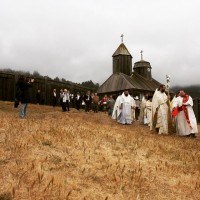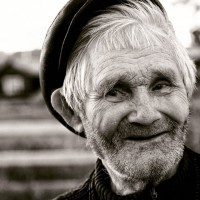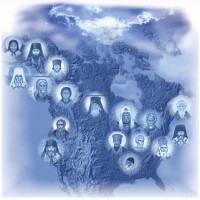An interview with Very Rev. John H. Erickson (Saint Vladimir’s Orthodox Theological Seminary, Professor emeritus).
The interview conducted Deacon Victor Yudin, www.bogoslov.ru.
Transscript:
“Orthodoxy in America is very diverse”. An interview with Archpriest John H. Erickson
Fr. John, we are very happy that you have agreed to give this nice interview. We would like to ask you few intimate questions. And the most intimate question of all, you would think, for an Orthodox priest is to ask – what is Orthodoxy like in America?
That is a barely intimate question. There are more intimate questions. I would say first of all that Orthodoxy in America is very diverse. It’s marked by a striving to be truly Orthodox which means that many people exercise and develop their Orthodoxy in the most American fashion – of a kind of “cafeteria” approach of picking and choosing those things there are most important. We have in the United States what is sociologist Peter Berger calls an “un-coerced clientele”, free to accept or not accept whatever. So we have many people, including those who could be described as cradle Orthodox, rediscovering Orthodoxy that may be different from what they were experienced as children, as young people. We find converts to Orthodoxy in a different sense of the word, coming from any number of Christian confessions or from non-religious persuasion whatsoever attracted by the wealth of offerings that Orthodoxy provides at this spiritual cafeteria.
It sounds like an Orthodox consumption society, isn’t it?
The United States is very much a consumer society. And consumer preferences sometimes play a role, invariably play a role. And especially in the internet age, lobbies of one or another blogs promoting one vision or another of Orthodoxy, is very common, and people will certainly believe what they find stated so convincingly on a blog before they believe me, a priest.
This reminds me a really major discourse advanced by Fr. Alexander Schmeman concerning modern Orthodox secularism.
I think we can distinguish several aspects or meanings to secularism. The United States, first of all, is different from much of Europe. There has never been a strong anti-clerical tradition in the United States. In fact, there has been a very strong religious tradition, or many religious traditions. It has been described as the nation with a soul of a church, distinguishing in this way, let’s say, from France today where there is secularity. The Secularism of the United States could be described almost as sacred secularism.
What is that?
It is adopting things sacred for your particular secular purposes. It comes easily to be associated with patriotism. The temptation for Orthodoxy in the United States is not a simple kind of secularism that can’t be bothered about things religious or things spiritual, that can’t be bothered about God. Many people are preoccupied with such questions. Neither it’s a simple consumerism. We want more of everything for ourselves and we think everybody else should be wanting this as well. It is a different kind of secularism. It’s a secularism which tries to domesticate God and everything powerful for our own instrumental purposes. It’s utilitarian use of religion and almost every other prop that we have.
What is a contribution of academic theology to the real Orthodoxy? Does it change anything?
Serving on church commissions, going on delegations to Constantinople or to Geneva or any other place you might wish to mention? So much what we consider important in Orthodox Church life takes place at this level and has very little impact on congregations or on those people we might like to reach. This is very exciting subject for some people. Let me explain my experiences since retiring from St. Vladimir’s Seminary, since teaching students for over thirty years, people in many cases becoming priests. Right now I mostly substitute in churches on week-ends and serve regularly in certain others. I serve almost equal amounts of time in a parish of a Greek Orthodox Church Diocese, in a parish of Antiochian Orthodox Church Diocese, a parish of Orthodox Church in America, Russian Tradition and a parish of a Serbian Orthodox Church. Four parishes, two calendars, four very different sets of history and even more reductions of Orthodoxy or preconceptions of Orthodoxy that people have. The question in this situation is what Gospel am I to proclaim. This is not just the question of what the Old Calendar or the New Calendar prescribes for the day in question. What Christ am I to proclaim to these people, what good news do I have to offer? Do I have good news that will challenge those who are comfortable to be the eastern rite version of country club Christianity in the Unites States? Do I have the words to challenge those who would value Orthodoxy above all because of its fidelity to rubrical details? I can no longer be too concerned about rubrical details. One of the churches I serve in has curtains and doors, another has doors, no curtains, another has curtains, no doors and another has neither, nor.
And you accept them all.
I have no choice. And my goal is not to challenge them on the subject of doors and curtains. The question is what is going to reach people where they are. Here I would say that in the study of theology, in study in theological seminaries and academies, we do a wonderful job teaching Church History, Patristics, Systematic Theology. We could spend more time on the sociology of religion and various countries and specifically the sociology of people in our parishes today, so that you are not left for words saying the wrong words. Those preparing in our seminaries may learn even how to speak to someone who has been bereaved or other pastoral situations. But the pastoral challenge is in fact much bigger in the United States at least. The rate of divorce of Orthodox Christians is right on the national average, white colour crime is the same, every statistical measure of a conversion that is inward and not simply external, we are simply where the rest of Americans are.



















